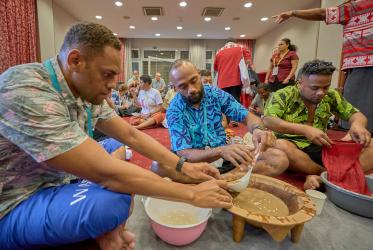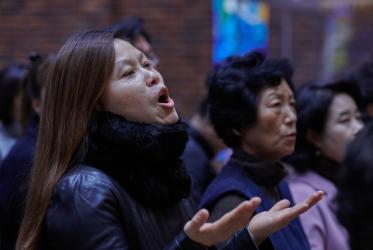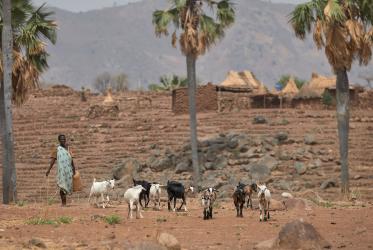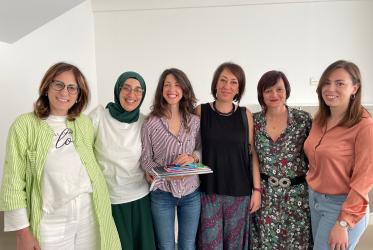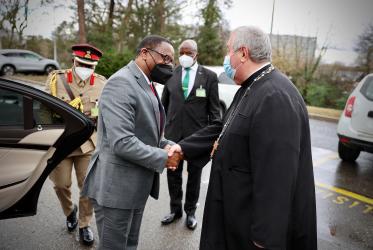27 April 2021
Nairobi, Kenya
Good morning and good afternoon brothers and sisters in Christ. Let me start by appreciating the organizers of this AACC-WCC consultation; especially the AACC leadership for taking time to be part of this process of reflection and harvesting. This consultation is timely indeed as Africa is experiencing a number of socio-economic and spiritual challenges and opportunities related to the pandemic and as we prepare to share our stories of our journeys since Busan 2013.
Thank you for those of you who have and will speak and to all participants for taking time to meet and share. I would like therefore, to take this opportunity to heartily welcome each one of you to this important consultation which is one in a series organized by WCC. Your input is valuable!
It is our hope and expectation that the outcomes of these consultations will form the backbone of reflections, experiences and lessons learnt for future work on justice and peace by churches, ecumenical organizations and people of good will. As you are aware, this consultation is held at a critical juncture in the progression of the COVID-19 pandemic in Africa, sometimes referred to as the third wave.
The so called third wave is claiming many lives whose actual numbers we may never get to know. And the inability of families to provide decent send-off and therefore appropriate closure is a contributing factor to trauma.
Allow me to share a few thoughts regarding the theme and in particular in relation to the 10th WCC assembly statement on the Pilgrimage of Justice and Peace, which in my view is seriously challenged by the pandemic. The call anticipated continued walking, working and praying together for justice and peace in a world so unjust and so violent. What the pandemic has illustrated is the interconnection of unjust global structures and systems; and the non-functionality of governance and economic paradigms in our present contexts. But above all the resilience of God’s people amidst adversity continues to amaze us.
- Whilst it is unfortunate that we cannot meet face-to-face, we thank God that there is an alternative method namely, digital-electronic. This pandemic has hastened the application/use of social media technology especially in the delivery of sermons, thus keeping the mission of the church alive somewhat. Many pastors and church workers have had to sharpen their skills in this area. The Busan approach seems compromised by the pandemic as we hardly can meet in worship spaces, let alone visit one another. But as the Bible states, “in everything give thanks” because:
- Families have had more time together at home
- Family churches, prayers and fellowship have taken shape
- Closure of jobs has in a limited manner resulted in seeking alternative means of income
- The pandemic has reawakened realization among some people of the fragility of life –hence serious rethinking of priorities in life.
- Of course a number of challenges persist and you are better informed than I may be. For example,
- The role of pastoral ministry and especially ministry of presence is under attack. Visitations to the sick, the dying and even bereaved are very limited (a core part of mission).
- The church has lost a number of leaders and members to the pandemic. It just dawned on me that we consider essential services and health frontline personnel but pastors are not considered as frontline personnel requiring support.
- All forms of violence, besides being on the increase, have been exposed—emotional, physical, mental, etc.
- Faith communities and women’s movements have, in a constrained environment, sought to accompany communities and individuals in the ever growing cycle of poverty –poor housing if any, poor nutrition, poor health, poor education
- The notion of eco-justice – economy of life is at stake
- Just access to vaccines is problematic let alone hesitation by populations due to poor information
- It is essential that the AACC – WCC reflect together, and offer ideas and suggestions on how to restore and enhance justice and sustainable peace especially since most of the SDGs may not be fully realized in the immediate future.
- There is urgent demand to be part of the healing of broken bodies, minds and spirits as we echo the call by CWME in 2018 to be transformative disciples of Jesus Christ. What does this and what would these type of processes look like? What do we already do and know?
To conclude, the Pilgrimage of Justice and Peace Busan statement was a call to seek justice and peace for all. It is a journey that invited us all to testify to our lives (CCIA). Definitely this call is under test by COVID -19 and the mission of the church must continue to advocate justice and peace for all.
This consultation is a journey into harvesting of our stories, our experiences, our lessons on the pilgrimage of justice and peace and the impact of COVID-19 on mission of the church. The outcome will inform our collective and individual work in the coming years especially when we gather at the WCC assembly in 2022.
May we find ways to restore and re-energize the spiritual and material lives of communities. God bless Africa! God bless the Church.
